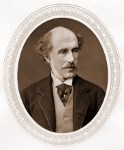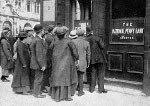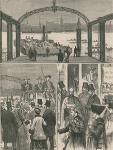

East
and West
London
Being Notes of Common Life and Pastoral Work
in Saint James's, Westminster and in Saint Georges'-in-the-East
by the Rev
Harry Jones, Rector of Saint George's-in-the-East (Smith, Elder & Co, London 1875)
Education
| The district church (parochial) school to which Harry Jones refers, in arches under the Blackwall Railway, is described here. The new Board School was that in Lower Chapman Street, built in 1874-75 to designs of 1873. See here for the comments of the Rector of Christ Church Watney Street on Betts Street Board School. |
 The 1870 Elementary Education Act
(sometimes known as the 'Forster Act'), which established Board schools
for all, included the much-contested 'Cowper-Temple clause' (s.14) which
specified - mainly to appease nonconformists - No religious
catechism or religious formulary which is distinctive of any particular
denomination shall be taught in the school. It was named after its
proposer, Liberal MP William Cowper-Temple
(as he had become: his name, and its pronunciation, was perpetuated
from 1998-2007 by the catchy title of a rock band 'Cooper Temple
Clause'). Liberal clergy like Harry Jones saw the sense of this, as he
argues below, and welcomed the advent of the Board schools, but other
Anglican clergy continued to object. He returned to the theme of religious education in later writings - see here. The 1870 Elementary Education Act
(sometimes known as the 'Forster Act'), which established Board schools
for all, included the much-contested 'Cowper-Temple clause' (s.14) which
specified - mainly to appease nonconformists - No religious
catechism or religious formulary which is distinctive of any particular
denomination shall be taught in the school. It was named after its
proposer, Liberal MP William Cowper-Temple
(as he had become: his name, and its pronunciation, was perpetuated
from 1998-2007 by the catchy title of a rock band 'Cooper Temple
Clause'). Liberal clergy like Harry Jones saw the sense of this, as he
argues below, and welcomed the advent of the Board schools, but other
Anglican clergy continued to object. He returned to the theme of religious education in later writings - see here.
|
| The following paragraphs discuss Raine's Foundation Schools, and in particular the benefactor's curious marriage portion lottery;
he calls calling for an overhaul or reform of both, describing the abuses to which the latter was open. (Note: the
legal action for breach of promise of marriage - which lies at the
heart of Gilbert and Sullivan's one-act comic opera of 1875 Trial by Jury - was abolished in 1970.) |
| This brief chapter provides Harry Jones' take on the institutions in the neighbouring parish of St Paul Dock Street (with which relationships had been strained in Bryan King's time); by this point, St George-in-the-East was no longer running its own maritime projects. |
| Here is a list of all the pubs, past and present, in the civil district of St George-in-the-East, and a map of the location of pubs from the early 20th century. |
| See here for more on Ratcliff Highway. |
| Mary Steer
commented that prostitutes pleaded their knitting as an excuse for not
attending her meetings - she told them to bring it with them. See here for the 'Tigresses' around Betts Street. |
| Dr John James Rygate,
of 126 (later 116) Cannon Street Road, was born in 1825 and was the
Medical Officer of Health for St George's for many years. (His annual
salary in
1873 was £150 - the average figure across London, though some were paid
more, e.g. £450 for Hackney and £600 for the City; in Wandsworth,
separate officers for each of the seven divisions were paid £50 each.)
In 1880, after 32 years in post he tendered his resignation;
but, according to the Lancet, he received so many expressions of
kindness and sympathy that he was induced to ask permission to withdraw
his resignation; this was granted, and he was given two months' leave
of absence. He was still in post in 1898 - when he was interviewed for the Booth archive. By 1901 he had retired to Hove. He had four sons, all of whom entered the medical profession, and three daughters. Harry Jones refers later to his role in condemning slum housing. R.H. Hadden also includes quotations from his slightly later reports, in his 1880 book East End Chronicle. |
| ° The Metropolitan Sanitary Commision
made its first report in 1848 - the dangerous state of the water was
its chief concern (and it was belatedly realised that this was the
chief cause of cholera which ravaged various parts of London in the
mid-century.) William Quekett had been instrumental in setting up the Association for Promoting Cleanliness among the Poor a few years earlier. ° The curious (but commonly-used) name 'Smoke-Consuming Act' refers to the Smoke Nuisance Abatement (Metropolis) Acts of 1853 and 1856, which empowered the Home Office to appoint an inspector to work in consultation with the Metropolitan Police to abate nuisance from the smoke of furnaces in the metropolis and from steam vessels above London Bridge. These provisions were not effectively enforced.The 1875 Public Health Act contained a smoke abatement section, on which subsequent legislation was based. As for his comments about smuts and 'factory blacks', as he says elsewhere, when the wind was in the east (and coal usage was highest) these tended to go west! ° For detail about the Rectory - one of the few detached houses in the area - see here. |
| This version of the site and personnel on which Dickens based the opium den in Edwin Drood is compared here with other accounts. Harry Jones returns to this theme below in relation to slum clearance. |
| See here for an explanation of local government arrangements, and here for details of the Vestry Hall in Cable Street. His desire to see a further reduction of 'out-relief' (and his praise for the work of the Poor Law guardians - whose membership overlapped to some degree with the parochial officers) links to his comitment to the ideals of the Charity Organisation Society. See here for details of the parish workhouse in his day. |
| (1) The object of the Company is to establish Penny Banks, on
commercial principles, in London and elsewhere, similar to that which
has been so successful in Yorkshire. (2) The main wish of the promoters is to encourage habits of thrift among the industrial classes, to extend the facilities for saving, and to manage the business in such a manner as to secure that those in the receipt of weekly wages may use the Bank. The establishment of the 'National Penny Bank', on a strictly commercial basis, has been determined upon, to prove that the industrial classes do not desire, or in any way need, charitable assistance to provide them with facilities or inducements for saving. At the same time the promoters, beyond providing powers to declare a dividend not exceeding 5 per cent, do not enter into the scheme as a commercial speculation. (3) The Yorkshire Penny Bank has been founded about fifteen years. It now holds invested deposits to the extent of nearly £400,000, and is a strictly commercial undertaking. Its success warrants the promoters in hoping that in London even greater results may be obtained. (4) The undertaking is intended to be supplementary to the Post Office, and other Savings and Penny Banks, but its minimum deposit will be as low as one penny. (5) It is intended to make the rules and regulations of the Bank as popular as possible; to bring the Bank to the people; to start branches, wherever it can be done, at workshops and places of business ; to avoid complicated and unnecessary restrictions; and, in fact, to carry on the work of the Bank in promoting thrift, in the same way and with the same facilities with which a successful trader in any other business seeks to develop his custom. (6) The Bank proposes to facilitate the purchase of Consols in small sums, to promote Life Insurance, both in the Post Office and elsewhere, to make known the advantages of Deferred Annuities, Endowments, and other means of saving, and to facilitate by the machinery of the Bank, which will provide for the collecting regularly of small sums, the possession of such securities by the weekly-waged classes. (7) As soon as one thousand shares (of 10/- each) are subscribed for, it is proposed to commence business by opening a branch in each of the Metropolitan boroughs. |
Here
is a brief explanation of the history of provident clubs and societies
- which initially served a valuable function, and arguably continued to
do so despite Harry Jones' pleas for a more 'professional' approach:
recent banking history has shown the dangers of this, even for
socially-conscious banks, and the value of local and mutual principles
(e.g. credit unions) have been rediscovered.  William Quekett had instituted a Penny Savings Bank at Christ Church Watney Street as early as 1842 - see this article from 1859 in Dickens' journal All the Year Round
- which later amalgamated with the Tower Hamlets Savings Bank (of
nonconformist origins), then with the East London Savings Bank,
becoming in 1980 part of the Post Office Savings Bank (set up by
Palmerston's government in 1861 when Gladstone was Chancellor of the
Exchequer). Dan Greatorex
at St Paul Dock Street also set up a penny bank and provident fund. So
there were already local models; but the proposal for a National Penny
Bank which Harry Jones quotes with approval draws more particularly on
the Yorkshire Penny Pank [for which the present Rector of St
George-in-the-East still has a savings box]. Right is a queue outside the National Penny Bank headquarters in 1914 when it closed temporarily at the start of the War. William Quekett had instituted a Penny Savings Bank at Christ Church Watney Street as early as 1842 - see this article from 1859 in Dickens' journal All the Year Round
- which later amalgamated with the Tower Hamlets Savings Bank (of
nonconformist origins), then with the East London Savings Bank,
becoming in 1980 part of the Post Office Savings Bank (set up by
Palmerston's government in 1861 when Gladstone was Chancellor of the
Exchequer). Dan Greatorex
at St Paul Dock Street also set up a penny bank and provident fund. So
there were already local models; but the proposal for a National Penny
Bank which Harry Jones quotes with approval draws more particularly on
the Yorkshire Penny Pank [for which the present Rector of St
George-in-the-East still has a savings box]. Right is a queue outside the National Penny Bank headquarters in 1914 when it closed temporarily at the start of the War.
|
| Pieceworking, with armies of home-based workers (including children) performing one distinct element of garment manufacture, was to become a key feature of the rag trade, and Harry Jones notes its demoralising effect. He recognises the desperate need for relief from its monotony, so - unlike other Christians of his day - was no sabbatarian. |
| Harry Jones' earlier comments about Edwin Drood are here, and they are compared with other views here; the East London Railway cut through the parish from Wapping to Whitechapel, and did indeed result in the demolition of the courts mentioned. |
| Dwellings for the poor might be erected of a better character, by placing more power in the hands of an active local or general board, with greater and cheaper facilities for the purchase of property ill-constructed or kept, and the erection on the land of properly ventilated and drained, and otherwise well constructed edifices, occupying no more ground than those removed, but extending in the only other fit direction, namely, upwards. Such dwellings would let well, and would be a great saving to the rates, as many would have their amour propre raised by living therein, and thus be kept off the relief list. Thus a parish could afford to pay a fair price for such property, and be satisfied with a moderate interest. Looking at the subject in a broad view of it, there could be little doubt of this, and with the great local experience of the members of the parochial boards, such purchases might safely be left in their hands. |
| See above for Dr Rygate. The Act which became law during the writing of this book was the Artisans' and Labourers' Dwellings Improvement Act, more commonly known as the 'Cross Act' [Cross was Home Secretary - Hardy was a Member of Parliament who managed its business], enabled compulsory purchase for slum clearance; see here for more details of this legislation and its local impact. For the local Peabody estate see here. |
| More detail about Harry Jones' vision for turning the former churchyard and neighbouring sites into a public garden can be found here, with archive material here. |
  The Thames Steam Ferry
ran from 1875 (with an official opening the following year) until 1886,
between Tunnel (formerly Middleton) Wharf next to Wapping Dock Stairs
and Rotherhithe Church
Stairs - more or less above the route of the Thames tunnel. It was
serviced by two near-rectangular iron paddle boats, 82' long with decks
42' wide, with rudders at either end, the Jessy May and the Pearl.
There were problems designing a landing stage to meet the rise and fall
of the spring tide while complying with the planners' requirements;
eventually a large lifting platform at the landing stage with winding
drum with heavy chains and a 120hp steam engine was used. It ran daily,
except Sundays, from 8am to 6pm. Fares were 1d. for passengers, 6d. a
head for cattle, a cab with fare 8d. (returning empty free) and between
8d. and 2/6d. for other vehicles, depending on the number of horses.
The estimated building cost was £53,369, with annual running costs of
£11,330 and expected earnings of £30,000. But it was not successful in
attracting traffic away from the London Bridge detour; service were cut
to one vessel, and when Tower Bridge was opened the steam ferry was
bought out. (In 1892 another ferry, from Rotherhithe to Ratcliffe, was
mooted, but plans were later abandoned; and in 1905 the London County
Council ran 'penny steamers' - 30 paddle boats plying between
Hammersmith and Greenwich, with a stop at Tunnel Pier - but despite
carrying 10 million passengers in the first three years it was declared
uneconomic and closed; the pier was finally removed in 1948.) The Thames Steam Ferry
ran from 1875 (with an official opening the following year) until 1886,
between Tunnel (formerly Middleton) Wharf next to Wapping Dock Stairs
and Rotherhithe Church
Stairs - more or less above the route of the Thames tunnel. It was
serviced by two near-rectangular iron paddle boats, 82' long with decks
42' wide, with rudders at either end, the Jessy May and the Pearl.
There were problems designing a landing stage to meet the rise and fall
of the spring tide while complying with the planners' requirements;
eventually a large lifting platform at the landing stage with winding
drum with heavy chains and a 120hp steam engine was used. It ran daily,
except Sundays, from 8am to 6pm. Fares were 1d. for passengers, 6d. a
head for cattle, a cab with fare 8d. (returning empty free) and between
8d. and 2/6d. for other vehicles, depending on the number of horses.
The estimated building cost was £53,369, with annual running costs of
£11,330 and expected earnings of £30,000. But it was not successful in
attracting traffic away from the London Bridge detour; service were cut
to one vessel, and when Tower Bridge was opened the steam ferry was
bought out. (In 1892 another ferry, from Rotherhithe to Ratcliffe, was
mooted, but plans were later abandoned; and in 1905 the London County
Council ran 'penny steamers' - 30 paddle boats plying between
Hammersmith and Greenwich, with a stop at Tunnel Pier - but despite
carrying 10 million passengers in the first three years it was declared
uneconomic and closed; the pier was finally removed in 1948.) |
| In the event, Harry Jones befriended Mary Steers and was an active supporter of her non-denominational Bridge of Hope Mission in Betts Street, chairing its committee, and continuing to send her his Easter offering even after he had left the parish. |
«« East and West London 1 | «« East and West London 2 | «« East and West London 3 | Harry Jones | St George-in-the-East Clergy 1860-1900